Community Information; Common Rooms
The common room is the best place to become acquainted with your fellow students. When you are accepted as one of our newbies, we ask that you fill out this welcome survey to introduce yourself to your house mates by posting this in your common room.
Name/Age/Location:
AIM/Yahoo/MSN/Other:
Fandoms/Ships:
Music/TV/Movies/Literature:
Last Words:
LION'S HEART:
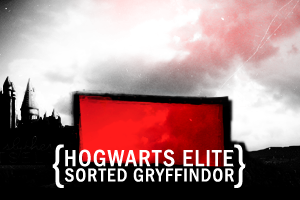
WHAT DEFINES A GRYFFINDOR?
Essay By: zia_narratora
Title: What Defines a Gryffindor?
“…The boggart sitting in the darkness within has not yet assumed a form. He does not yet know what will frighten the person on the other side of the door. Nobody knows what a boggart looks like when he is alone, but when I let him out, he will immediately become whatever each of us most fears.”
--Remus Lupin
Fear. Fear is one of the most terrible emotions a person can feel. It can paralyze, it can eat us alive, it can gnaw and tear and brutalize. It can make us cry, scream, act in terror or rage or humiliation. It makes us lash out; it makes us hide under the bed. It makes us tingle with cold, sets our hair on end, our teeth on edge, and our stomachs to twisting and turning.
Fear’s greatest power over us is that it has power over us. So many people are plagued by impossible fears or irrational fears-fear of snakes, fear of spiders, fear of the dark. Fear of slugs, fear of dandruff.
Naturally, dandruff is not something to be afraid of. Nor are strawberries or giant chickens or porpoises. But that is the very essence of fear-that it need not make sense, that it simply is.
Some fears are more rational, more reasonable. A werewolf fears the moon. A nervous child fears his least-liked professor. An orphan fears the thing that killed his parents. A world fears magic it can’t understand. Magic fears a world that could squash its existence. Fear begets fear.
A person, a school, a government, a country, a world can wallow in fear, let fear take control. But a person, a school, a government, a country, a world can take control of fear. It is not the nature of the brave to be without fear. It is the nature of the brave to confront fear, face to face-to look into the face of the moon, to ridicule the teacher who berates us, to confront the person who hurt us most, who destroyed the lives we could have had, to embrace the things that, at first glance seem strange, foreign, dangerous, unknowable. It is the nature of the brave to act in spite of fear, to understand fear, to move beyond fear. It is the nature of the brave to smile in spite of the hairs-on-end. It is the nature of the brave to speak in spite of the butterflies in our stomachs.
It is the nature of the brave to challenge our enemies, to raise our voices, our fists, our swords, our wands, even if our enemies are mighty and we are small. We do not do this because we believe we will win. We do not do this because we believe we can win. We do this because we understand, down to the very core of our being, that if we do not face our fears, we will never achieve anything.
We do not laugh in the face of rejection or failure. Rejection and failure wound the brave as much as they wound the cowardly. We do not like being let down, being turned down, being hurt, being rejected. We ache when we are not good enough, smart enough, talented enough, valuable enough. We can fall off ladders, fall down stairs, be hit by a car ,shot by a gun, drown, break, shatter, collapse. We are not all strong. A brave soul may be weaker, in strength or stamina, than a cowardly soul. But the brave realize that if we protect ourselves too much from the things we fear, we will never have the capacity to succeed, that untried potential means nothing if we coddle it and protect it from the world. We realize that rather than avoid the things we are most afraid of, we must confront them head on, or we will let them control us.
Essay By: spikespetslayer
Title: The Gryffindor In Us All
Defining the Gryffindor perspective according to the Harry Potter canon should be simple, but it is anything but that. Although in the books we see more of Gryffindor House than any other, the diversity of the House members themselves precludes any stereotyping of a Gryffindor persona or characteristic.
Looking at the various members of Gryffindor in the Harry Potter canon, however, we can draw several conclusions as to why the Sorting Hat places such a wide variety of people into Gryffindor. Within them lay certain defining characteristics that were evident within their hearts and minds that the Sorting Hat picked up on, even if they were unable to see them in themselves.
I believe that one of the most defining characteristics that is evident House-wide is idealism. Gryffindors envision the world in a certain perspective that is peculiar to their house alone; the idea that the world is fair, good deeds are rewarded and bad deeds are punishable.
Along with this idealism, Gryffindors believe in rules-not as hard-set, written in stone laws, but more as guidelines on the way to live and act in society. They aren’t afraid to bend or even break them as a means to and end; the don’t see themselves as above them, just that they are malleable and easily warped to the situation at hand. If the situation warrants a little rule breaking, Gryffindors are able to justify their actions with little to no guile; it was because the right thing needed to be done, no matter what the right thing was.
While courage and bravery are often mentioned as Gryffindor characteristics, they are oft played up as the defining qualities instead of the reasoning behind them. A Gryffindor's courage comes from their passionate belief in right and wrong. Courage, for the Gryffindor, means standing up for what they believe in no matter how unpopular that belief may be.
Bravery follows courage in its own way. It is fortitude and valor that qualify the Gryffindor for their brave acts, not the bravery itself. It is the ability to withstand the odds, face their fears and act beyond them that classifies a person as brave.
Behind all of these qualities lies the strength of the animal that represents the House itself-the lion. Strength of mind forces the Gryffindor to think of the alternatives and other options that are open to them. Strength of heart allows them to be loyal to their opinions and causes, no matter how different from the mainstream. Strength of character assists them to stand alone when necessary or as a group when challenged.
While each Gryffindor that has been portrayed in canon have their own individual characteristics and quirks, their idealism, courage, and strength are evident in every one of them in one way or another. In choosing what could possibly define such a variety of people, these are the words that come to mind. It makes us bold, it makes us daring, and it makes us chivalrous. It makes us quintessential Gryffindors.
BLOOD SERPENT:
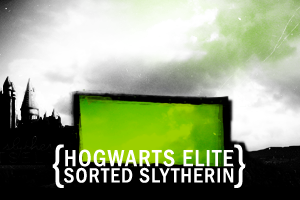
WHAT DEFINES A SLYTHERIN?
Essay By: ariesathena
Title: Listen to us when we're trying to talk to you!
What defines a Slytherin?
After almost three years in the community, this is a question that most Slytherins have tried to tackle in some way or another to shelter our house from the SPAWN and gothic bartenders of the world. Usually we craft well reasoned essays, supported with examples from both canon and real life to demonstrate the traits that we look for in applicants and what is important to us.
That doesn’t seem to be working.
Probably because we’re asking the wrong question. The question shouldn’t be what defines a Slytherin, but who defines a Slytherin? (Yes, I realize that J.K. Rowling is the appropriate answer to that question. For the sake of this essay, I’m talking specifically about the definition of a Slytherin at Hogwarts_Elite.) We can rattle off a list of traits: ambition, cunning, subtlety, ability to read between the lines and appreciate the shades of grey in the world, but ultimately when it comes to sorting, that isn’t what truly matters. What really matters is whether or not we, the members of the Slytherin house, identify the applicant as one of our own.
Yes, an applicant still has to actually display Slytherin traits to be sorted into our house. But whereas, some of you seem to think those Slytherin traits must be a desire to take over the world and manipulate everyone around them, we recognize that ambition takes many forms, admitting outright that you’re a manipulative bitch is not actually a good thing and declaring that you are oh-so-cunning is really anything but.
The reality is, when you suddenly see all of the Slytherins turning out en masse to claim an applicant, it’s not because they’ve managed to hit all of the boxes on our secret in-house checklist (really, we only play bingo with the worst of the Slytherin pushers.) It’s because we see something in the applicant that just resonates with us. We can’t explain it to you or define it beyond saying it’s really just a sense of je ne sais quoi which is why we ask you to trust our judgment on these applications. When we say that “Slytherins know their own” that is exactly what we are referring to - an applicant who belongs with us just fits. It comes through in her tone of writing, her word choice, the way she carries herself and more than anything else, what she has left unsaid, what we read between the lines. We don’t blame you for not seeing it. Really we don’t expect you to. We just ask that you trust us when we do.
I do, however, want to take a moment and clear up a few misconceptions about Slytherin traits. First, there is the issue of ambition. Now everyone knows that Slytherins are the ambitious ones. Apparently some of us would sacrifice our own children for a little recognition from Voldemort. (Although really, let’s try to avoid using Bellatrix as the model of a Slytherin.) But whoever said ambition means you won’t be satisfied until you’ve managed to knock God himself off of the mountain and become Supreme Ruler of the Universe? Yes, we have those types in our house. But ambition comes in many forms and really, is present in every house in its own way. Look at Ron’s Mirror of Erised vision - to be Head Boy and Quidditch Captain. That’s certainly rather ambitious for him, but that doesn’t make him a Slytherin. And then you have Narcissa, who as far as we can tell, has no interest in world domination, or even working at all for that matter. Her ambitions appear to be solely focused on her family. Does this mean that Ron is more of a Slytherin than Narcissa? Hardly. Slytherin ambition is not about setting lofty goals for yourself. In fact, it’s the opposite. Slytherin ambition is setting out carefully measured goals that are actually feasible and then doing everything in your power to achieve them. We care far more about what an applicant is doing to achieve their goals than the goals themselves. Because really, when we all close our eyes, we can come up with all sorts of fanciful visions for ourselves. But Slytherins are pragmatists and the last thing we are going to do is set ourselves up for failure by setting some absurdly unattainable goal for ourselves and then publicly announcing it to a bunch of strangers on the Internet.
Also, as a general rule of thumb? If someone comes in and starts spilling their guts about how they were abused as a child and they’re depressed and they need to lose twenty pounds and they really want a boyfriend? Yeah, not a Slytherin. No self-respecting Slytherin is ever going to spill their guts to a bunch of strangers like that. We don’t even share those kinds of things after we get to know each other.
Then we have the issue of Slytherin=bitch. Yes, I fully realize that the examples of Slytherins we see in canon are mostly rather unpleasant people and even if you take away the filter of seeing them all from Harry’s perspective you’re still not going to be able to explain away the love of torture and baby killing. That doesn’t mean we want them in the community. And that certainly doesn’t mean we have exclusive claim to the “bitch” stereotype. If someone comes in and is clearly just a deeply unpleasant person who doesn’t play well with others, that doesn’t mean she’s a Slytherin, thanks. (And really, thank you for reaffirming how we think you really feel about us in the process.) On the other hand, we also realize that there are some people who really just don’t understand our personality and where we see our newest housemate, you may see someone you would never in a million years want in the community. Which brings us right back to trust us. As the unofficial dumping ground for all the manipulative bitches out there, we’ve gotten pretty damn good at distinguishing the wankers from the ones who would be a good addition to the community.
Essay By: 3_foot_6
Title: Machiavelli Was On To Something: A Slytherin House Manifesto
Machiavelli Was On To Something: A Slytherin House Manifesto
A Slytherin is patient, a Slytherin is kind, a Slytherin does not boast...
No! That's love. My mistake.
A Slytherin is often none of those things, come to think of it. Especially the bit about the boasting. Boasting is our national pastime. Also eating toddlers and making members of the clergy nervous.
We don't take ourselves too seriously, but Merlin help you if you don't.
A snake is always two halves - the part you see, and the part you don't. But don't be fooled; it's not about duplicity. The Slytherin is perceptive and highly aware of image - slow to action at times, yes, but rarely lazy. They prefer to watch, listen, and learn before they act, and what may appear as an unruffled exterior is often masking the inner snake's constant calculations before coming to a decision. A snake is highly realistic in this regard and always knows exactly what he has, what he needs, and what he needs to do to get it. A Slytherin prefers to have the upper hand, and to act too quickly or reveal too much is to give up the subtle balance of power.
And the Slytherin is the master of subtlety. They know how to showcase strengths, downplay flaws, and persuade others to an ultimate goal without being seen as overly pushy. It may seem that the snake has an uncanny sense of luck or strange ability to always get his way, but the effect is not random. The inner snake is always hard at work behind the scenes, guiding situations to his advantage.
This ability is only of use, however, to a Slytherin able to see the bottom line. Slytherins do not persuade or intimidate others merely for sport (...okay, sometimes for practice); they are always looking several steps ahead to be certain of what they are guiding a situation toward. What is often seen as a certain, shall we say, flexible morality in the house of snakes is actually a singular focus on the ultimate goal and the understanding of the necessary steps to reach it. Whether the necessary steps are desirable ones is irrelevant. The snake knows that the shortest distance between any two points is a straight line, and if the line happens to cut through a gray area along the way, so be it. Contrary to popular belief, the goal itself is not necessarily an evil one and might even be a matter of public good - Slytherins are simply Machiavellian enough to take the most convenient route available to them in order to reach it.
Another popular but unfair description of Slytherin house is that its members are mean. "Meanness," however, implies a lack of purpose, and a Slytherin is never without purpose. They are quick to assess situations and act according to how they wish to influence it, whether the matter calls for charm (with, say, one's boss) or for ritualistic disemboweling (people who spell it "alot"...the phrase is "A LOT"," people). A failing of the snake in this regard is elitism or a tendency to dismiss those they consider beneath them, but chances are good that a Slytherin is treating you exactly how you deserve to be treated. If, for example, a snake is suggesting that you might consider a full frontal lobotomy, you'll want to rearrange your holiday plans accordingly. Interestingly, however, many snakes do not discourage the conception of them as "bad" or "mean," preferring instead to use others' fear of them as an advantage at a later date.
The need to feel powerful, talented, or important in a given field (or every given field) is the trademark of a Slytherin. Snakes can be slow to step outside of their comfort zones, preferring instead to remain in situations in which they feel powerful or familiar. They often resist new ventures at which they might fail, asking, "Why change what's perfect?" When thrust unwillingly into a new situation, however, the snake can be highly adaptable, quickly working, cheating, or persuading his way up the ladder back into his rightful position of superiority. "If you can't avoid it, pee on it and make it your bitch" is one Slytherin house motto. Maybe not the one we put on our promotional materials.
The Conclusion, or A Sorting Guide for Other Houses, or If You Think He's an Asshat
"How can I use this information to accurately recognize a Slytherin when I see one?" you might be asking yourself, "...so that I can avoid them and quietly discourage my child from unwittingly dating one?"
Here are some helpful ways to tell when you're dealing with a snake:
Fact: A snake is highly perceptive, both of himself and others.
Therefore: A potential snake will know that he belongs in Slytherin and the Slytherins, in turn, will recognize him as one of their own.
Conclusion: If the applicant indicates that he does not want to be in Slytherin, or if the members of Slytherin are not voting him in - he's not a Slytherin.
Fact: A snake is all about image; they know how to showcase talents and downplay flaws.
Therefore: If an applicant gives an unfavorable impression of himself, he is not concerned with (or not very skilled at) projecting a good image.
Conclusion: If you think he's an asshat - he's not a Slytherin.
Fact: A snake understands the importance of having friends, allies, contacts, minions, henchmen, and the like.
Therefore: An applicant who makes reference to "hating people," "no one understanding him," or "being a lone wolf" has no one to assist him in his plans of world domination.
Conclusion: If you think he's an asshat - he's not a Slytherin.
Fact: A snake is subtle at directing situations to his advantage.
Therefore: An applicant who egregiously hints at wanting to be in Slytherin is not being particularly subtle.
Conclusion: If you think he's a pushy asshat - he's not a Slytherin.
Fact: A snake does what he can to get ahead, including currying favor and kissing ass.
Therefore: An applicant who is combative or rude to the members whose votes he is attempting to win is fairly obtuse in this matter.
Conclusion: If you think he's an asshat - he's not a Slytherin.
Fact: A snake is skilled at revenge.
Therefore: Voting an applicant into Slytherin house who is clearly not a Slytherin is a likely way to get your toddler eaten and a member of your clergy frightened. Or perhaps your toddler frightened and a member of your clergy eaten. We're not particular.
Conclusion: If you think he's an asshat - he's not a Slytherin.
EAGLE EYED:
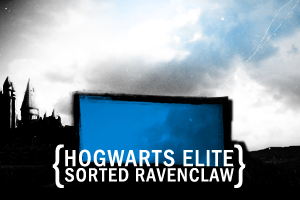
WHAT DEFINES A RAVENCLAW?
Essay By: skirmish_of_wit
Title: Those of Wit and Learning
Ravenclaws, according to the Sorting Hat, include "those of wit and learning" (SS/PS), "those whose intelligence is surest," and "those of sharpest mind" (OotP). We all know that these aren't the only Ravenclaw characteristics, though, thanks to a conversation between Hermione and Terry Boot in Order of the Phoenix, when Hermione reveals to the DA that she has placed a Protean Charm on the Galleons that they are going to use as notification for future meetings. Terry Boot responds by first marveling that the charm is N.E.W.T. standard, and then by demanding why Hermione, "with brains like [hers]," isn't in Ravenclaw. She tells him that the Sorting Hat had considered placing her there, but in the end settled on Gryffindor. This episode tells us explicitly what already seemed clear: intelligence alone doesn't characterize Ravenclaws, in spite of the Sorting Hat's shorthand. Otherwise Hermione would be in Ravenclaw.
The problem is that Ravenclaw characters appear so infrequently in canon. Cho Chang and Luna Lovegood are the primary examples, and they are such different personalities that it becomes difficult to extrapolate house qualities from the evidence that they provide. If you take Luna as the Ravenclaw poster girl, then it seems that we're all kooky dreamers with little care for social conventions. If you rely primarily on Cho, then Ravenclaws become the smart athletic type, popular and overachieving. Neither one seems to have much in common on the surface. So what values do they share?
They are both driven by the desire for knowledge in the matters that interest them most.
This to me seems to be the key quality of Ravenclaws: they pursue knowledge, but only the knowledge that interests them. Unlike characters from the other three houses, who pursue knowledge for practical ends (the Trio to find out more about Nicholas Flamel and the Sorcerer's/Philosopher's Stone, Tom Riddle to create Horcruxes, or Ernie MacMillan to earn as many O.W.L.s as possible), Ravenclaws pursue knowledge simply for the sake of understanding a matter they find intriguing, confusing, or both. Luna's quest for the Crumple-Horned Snorkack falls into this category, as does Cho's desire to understand what happened to Cedric.
It's also important to note that if a subject doesn't interest a Ravenclaw, then she often doesn't see the need to study it. The biggest false assumption that people make is that academic hard work signifies a Ravenclaw personality. Certainly, many Ravenclaws do work hard academically, but this is not a defining characteristic. Many Ravenclaws simply aren't interested in schoolwork and prefer to pursue different types of learning; Luna demonstrates this characteristic in canon, but a lot of Ravenclaws in hogwarts_elite show the same selective passion for learning.
In other words, Ravenclaw is the house of dilettantes: most likely to dabble in various areas of interest, then to abandon those areas when we find something else more intriguing. We value the pursuit of knowledge as much as the knowledge itself.
With this as a defining characteristic, Ravenclaw attracts many different types of personalities. Others often assume that Ravenclaws must all be "thinkers" rather than "feelers," or that Ravenclaw is the house of logic. It's true that many 'Claws are thinkers, but feelers can prioritize a pursuit of knowledge just as highly as thinkers can. Similarly, many people who are attracted to learning for its own sake do prize logic, but often Ravenclaws aren't interested in the type of learning that requires the sort of logic that Western thought after Aristotle has traditionally valued. Instead, Ravenclaws sometimes prefer their own internal logic and rely on their own observations rather than simply trusting the accepted wisdom that has come before them.
In that sense, Ravenclaw is not only the house of dilettantes, but the house of intellectual obsessions. We understand that the appeal of the Quest for the Holy Grail is that the Grail is never found. For Gryffindors, the quest might be about proving bravery and chivalry. For Slytherins, it would be about finding the Grail and making use of its various magical powers to achieve a certain end. For Hufflepuffs, it might be about the communal experience of all being Knights of the Round Table and all going through that quest together. For Ravenclaws, though, the quest itself is its own end. We are pursuers, and once we've gotten enough out of one pursuit (even if we never actually find the Grail we're searching for), we'll start on another.
In the end, the key word in defining Ravenclaws seems to be "learning" as opposed to "knowledge." "Learning" implies a constant state of progression, whereas the word "knowledge" is more static, placing more importance on the completion and achievement of the learning process. However, that continuous progression of learning, no matter what the area, is precisely what defines a Ravenclaw.
Essay By: haldirsbitch
Title: The Definition of a Ravenclaw
"The best moments in reading are when you come across something - a thought, a feeling, a way of looking at things - which you had thought unique and particular to you. Now here it is, set down by someone else, a person you have never met, someone even who is long dead. And it is as if a hand has come out and taken yours."
-Alan Bennett
"If people never did silly things, nothing intelligent would ever get done."
- Ludwig Wittgenstein
"I am so smart! I am so smart! S-M-R-T! I mean, S-M-A-R-T!"
- Homer Simpson
Intelligence is the most important quality a Ravenclaw should have, but one cannot be a Ravenclaw simply because they're intelligent. It depends on what motivates them, why they want to learn, what ideas they have, and how they go about discovering what they want to know. A Ravenclaw can be open-minded or close-minded; curious to learn more or firm in their beliefs, they value their ideas, and their personality can determine how they react to something new. A Ravenclaw can be a valedictorian, studious, and able at understanding anything they need to learn, or a simple person who decides they can discover the meaning of the universe through cake. A desire to learn is the primary characteristic of a Ravenclaw. They consider street smarts to be just as important as book smarts, and knowledge does not begin and end at the library.
The house colours are well selected. Blue is a colour commonly associated with intelligence, wisdom, and enlightenment. Religious paintings of the Abrahamic faiths used blue to show the sky and heavens, using the colour as a symbol of God’s glory in contrast to red, commonly used with brutish Satan. Blue has worked its way into more secular interpretations as a sign of knowledge, tranquility, and calm. Bronze is the perfect sub-colour for Ravenclaw as it implies progress. Bronze was one of the most common metals used in early civilizations for tools and weapons and The Bronze Age was so named, due to the use and length of the alloy. It helped push mankind towards new discoveries of how to improve their lives. Bronze is not cast away so easily, especially to the creative mind that knows how to manipulate into something useful.
The ever-changing floor plan was created by Rowena Ravenclaw, and it shows Ravenclaw's creativity at its finest. A Ravenclaw does not see red. They'll see scarlet, carmine, vermilion, or burgundy. They have finely tuned senses for detail, and their clever mind is always ready. Ravenclaws do not seem like easily enthused people, but if something interests them, it's best to step out of the way. They devour their interests, savour the details, and then wonder why there's nothing left when they're finished. So, they set out to do more. The details that make up the problem can fascinate even more than the result, and then they'll wonder "what's next?" They take pleasure in discovering, repairing, and creating, and it’s frustrating if another dismisses a correction with “whatever, same thing.”
One of the most important traits a Ravenclaw must have is curiosity. One can learn in order to pass a test, because they have to, or they want to accomplish something. A Ravenclaw learns because they want to. They must have that desire. Ravenclaws hate being bored, and the one word you will never hear to describe a Ravenclaw is boring. Ravenclaws are not defined by their grades, but by their personality and ideas. Luna is an outstanding model of a Ravenclaw because instead of developing her ideas based off facts already set down, she will speculate something new. You could wonder if there is life on other planets, or you could speculate if there is something else that could exist that is not an animal, mineral, or vegetation. The people considered crazy yesterday are remembered as geniuses today.
A Ravenclaw considers their feelings to be just as important as their thoughts. If two listen to a moving song, one can analyze why it is so emotional by dissecting the music and lyrics, and the other can respond with their instincts and reactions to understand why it's so touching. Ravenclaws are hardly an unemotional bunch. There will always be the stoics or the aloof, but emotions play their part. Moaning Myrtle is known for her sobbing fits, but she's also the first to figure out how to solve the second puzzle in Goblet of Fire. Cho tries to figure out how Harry feels about her, but her emotions get the best of her. Anyone’s emotions as an adolescent can get the best of them, but enough thought about how and why they react can be helpful.
Ravenclaws are sometimes seen as close-minded or aloof. If a Ravenclaw spends more time with their books than other people, it's probably not meant to be offensive. Claws can be private people and they greatly value their ideas and interests as very personal parts of themselves. If a Claw is uncertain of how to act in a social situation, they will always have their creations as comfort. They prefer to be selective of who they socialise with and enjoy the company of people who understand or influence their ideas. They like spending time around people who can help them and it can be frustrating to be with someone who doesn’t understand them.
Ravenclaws do not usually strive to be normal. Normal is boring. Unusual is fascinating. A Ravenclaw is unique and always unlike the other. One could be quiet and subtle, another outstanding and brash, but they will always be a wide spectrum of characters, brought together by their always starved curiosity; a lust for learning.
LOYAL BADGER:
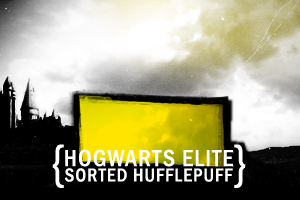
WHAT DEFINES A HUFFLEPUFF?
Essay By: ryla
Title: The Foundations of Functional Egalitarianism
Above and beyond the traditionally-cited examples of the perception of Hufflepuff house and its members--hard-working, loyal, true, brave, and just, examples pulled mainly from the first iteration of the Sorting Hat's song--there is the underlying theme that supports just why, and how, Helga Hufflepuff chose to found her house. Contrary to the often-negative canon and fanon viewpoints that Hufflepuff is the house of leftovers, cheerful dunces, or of "duffers," both canon and historical evidence will show that Helga Hufflepuff's selection of students was just as deliberate as the rest of the Hogwarts Founders; she chose people who, despite whatever background, socio-economic, or blood-purity they may have brought with them into the educational system, all are equally worth of the chance at learning. Modern-day Hufflepuff house continues this goal by accepting, training, and supporting students of often widely-differing origins, bringing together people through the strength of their differences, and creating a house with the potential to speak out in the time of struggle with one united voice.
This viewpoint hearkens directly back to the time of Hogwarts' founding; assuming truth in the Professor Binns' statement that Hogwarts was founded "over a thousand years ago--the precise date is uncertain--by the four greatest witches and wizards of the age," [CS] we can place this first meeting of Helga, Rowena, Salazar, and Godric some time in the year 1000 A.D. (A leap year.) For the rest of the European Muggle community, that year was a turning point in the beginning of what would become the 12th century renaissance, which was a time of rebirth and growth of knowledge that, while lesser known than its capital-letter Renaissance of the 14th through 17th centuries, still reflected the fact that western Europe was rapidly changing and growing, encountering new civilizations and making judgements on society at large.
It was at this time that the first medieval universities were founded, including universities in Bologna, Paris, and Oxford, as well as a time when the medieval learned mind was searching for understanding of Roman civil law, which had recently been re-discovered and put into translation for more university students to read and debate. The subjects studied at these early universities included Law, as well as Medicine, Theology, and various arts. They were intended for men only, a historical division that seems to have been treated differently in the Wizarding world at that time. It makes sense that, with such an expanding population, and a new idea such as a university, these four founders would have surely seen that the Muggle communities were expanding, trade was blossoming, and the first inklings of what would later become a free middle class were developing.
Yet all was not well. It must have been bad enough in these integrated communities to remark that "it was an age when magic was feared by common people, and witches and wizards suffered much persecution." This is entirely true; the International Code of Wizarding Secrecy was not instituted until 1692, (Also a leap year.) well after the founding of Hogwarts. Perhaps the role which Hogwarts fulfilled, as an institution, was more than that of a university--at least not a mere university in the medieval sense of the world. I believe that Hogwarts was founded more in the tradition of a medieval commune, a gathering of families, households, and tradesmen and women who usually possessed skills that would, normally, attract them to towns. This is what generally happened in the Muggle population; communes often were formed out of the need to defend or protect an isolated area, or a port, marketplace, or natural resource.
In terms of the development of the Wizarding community, this makes sense; Wizards, though not secluded by law, must have been secluded by the natural occurrence of their skills and the fact that like-minded (and similarly-abled) people tended, and still do tend, to group together. This was the origin of the Guild system, another Medieval establishment. Likely founded far away from prying Muggle eyes, to safeguard the training of their children and the development of their society, Hogwarts was likely not a fully-formed castle in its first incarnation (manily because castle technology had not been perfected in the early years of its creation) but a village, of sorts, containing shops and centers of trade, residences, and also a school. Early Wizards must have seen that the development of Magical powers occurs earlier, rather than later in life, and adjusted their teaching to fit the needs.
This is where Helga Hufflepuff comes in; it is nearly impossible to make inferences about the development of a style or philosophy of teaching without at least some understanding and appreciation of the origins and background--why were these choices made, and to what desired end? It is likely that all of the founders were responsible for different aspects of Hogwarts commune; Rowena likely oversaw the urban development, structure, planning, and logical matters, like enrollment and keeping of the records of births, deaths, and distribution and of material goods.Godric and Salazar were the defense and offense, respectively, of the town, clearly reflected in the modern houses' distrust of each other in Harry's time at Hogwarts.Godric would have been the creator of the fortifications, the walls, bridges, and superstructures that would eventually be the first line of defense. Salazar, with his cunning mind and love of secrecy, developed internal protections--the kinds of reverse-Trojan horses--that would ensure that, should anyone take Hogwarts byseige, they would never take it very far.
Helga, though credited with being the originator of many of the recipes used at feasts, also likely oversaw the teaching, but also the justice and law of the town, which included placement of farmlands and maintaining fair prices at the market. Even more likely is that this founding was the true founding of Hogsmeade village, a community which was nurtured by the rules set forth by the founders. She likely worked closely with Rowena, negotiating between the logical distribution needs and the sentimental, taking into consideration matters that more analytical-minded supervisors may not notice. Helga was likely out among the people--not that any of the other four weren't--but more so in the way of understanding that all levels of people, opinions, backgrounds ans situations. She would have understood that true egalitarianism is something that acknowledges, not denies, the individual differences that make a community what it is. The fact that all of the students have the potential to use Magic has not mattered, and continues to be irrelevant as to the nature of justice and morality in Harry's time; as Fudge remarks in the opening chapter of Half Blood Prince, the other side can do Magic, too.
Helga Hufflepuff would have been a remarkable woman; she must have been learned in formal law, or had some extraordinary opportunity at her disposal, to counteract the prevailing class-based themes of justice. All of the other founders' criteria are based on either explicit or implicit class distinctions; some people are just better than others, whether it is Wizards overMuggles as a group, or certain types of Wizards over other types. Helga's fierce cry for equality in the school system--and perhaps, by extension, to theWizarding community as a whole--was a revolutionary expression of egalitarianism, and likely paved the way for greater changes to occur. Even if the founders' intentions were to only create a school, and did not create a Medieval commune as theorize above, what we see in the modernWizarding community is that, by educating children, each successive generation can continue to build a society that, while existing alongside the Muggle world and the Muggle government upheavals, can maintain the key piece which holds theWizarding community together, a motto that Nearly-Headless Nick must have heard during his lifetime, as he mentions it in Order of the Phoenix: "Stand together, and be strong from within."
Could this philosophy be traced back to any other founder than Helga Hufflepuff? Her goal was not that Wizards would create the strong and the weak, the smart and the slow--nor that people should have to hide who they are and where their gifts clearly lie--but simply that if any community is to stay together, they must stick together. Modern examples, seen through the students ofHufflepuff house that we meet in our journey through Harry's eyes, show certain remarkable traits, including this fierce loyalty and sense of societal justice that transcendsfanon interpretations. Even the house ghost, the Fat Friar, is another telling addition to the goals of the house; A Friar is a religious person, called to a life of service to a community, not to a cloister. Students like Justin Finch-Fletchley and Susan Bones, for example, contrast greatly; one, a Muggle-born, upper-class, presumably rich boy with no background in this world whatsoever, and the other, aPureblooded witch with a family decimated by Voldemort. In the oft-cited article 'Secrets of the Class List,' by Diana Summers (Hosted at HP Lexicon), she remarks that the house of Hufflepuff is one of the more balanced houses, in terms of Wizarding diversity. In fact, Hogwarts as a whole has developed in a way which is remarkably consistent with the Muggle population at large, including nearly accurate percentages of religious, ethnic,socio-economic, and familiar origins & blood purity.
At the core philosophy of Hufflepuff house is the concept best defined as functional egalitarianism. Functional, in that it is a practical answer to a timeless problem, and egalitarian, in that it expects that all Wizards are created equal, and deserve the chance to speak up for themselves. In modern canon, we see examples ofHufflepuff house being both fulfilment and the disgrace of this ideal, but that is true of all the houses--because it is true of all people in general. This is a question, too, that American readers of this British series can understand; the American school system has often been focused on the end result of all students achieving a college education, to the detriment of trade schools, technical professions, and other careers. The net outcome of this intention is that students who are skilled with their hands, and would be excellent in a trade, are made to feel stupid, worthless, or somehow undervalued because they cannot sit in a classroom--or even afford to do so. Yet Jo has set up a system that many Brits can identify with, in that theWizarding school system is, essentially, a trade school. This, coupled with the fact that Jo herself has stated that Hufflepuff house is symbolized by the element of Earth, reinforces the idea that Hogwarts, and, some may say, the Magical community at large, is not afraid to work in what would be the equivalent of a trade or a technical profession. Even professors at Hogwarts have no university education, (because, as Jo has explained, there is noWizarding University,) which means that they must be technically proficient in their field (or at least put up a convincing front, a la Lockheart.)
For all that the Wizarding world has an amazing amount of powers, spells, enchantments, and fantastical inventions and developments, there are still limitations--and people are still people. To understand, then, what truly defines aHufflepuff is to ask what defines a person, or a Wizard, in the context of their own history, skills, desires, and goals. Though other houses have their own grand accomplishments that can in no way be diminished, the history ofWizarding society is tied in deeply with the land--ancient places of natural magic--the people, and the unspoken limitations to Magic. It is between these limitations and successes thatHufflepuff's true character lies. Though we have less canon evidence to go on in comparison to other houses, Gryffindor in particular, because we have a direct viewpoint inside the house, through Harry's eyes. Other houses may be concerned with theories, logistics, and numbers, they may be focused onachieving power or success, or making a name for themselves. But Helga Hufflepuff is the originator of recipes that can feed hundreds of people--now, hundreds of students--and its easy to picture her going door-to-door in those early days of Hogwarts' founding, placing her hand on a fevered brow, grinding and administering potions to the sick, making sure the poor had heating charms on their houses, checking on an expectant mother, taking stock of the supplies for the winter. Just like Mrs.Weasley's famous clock, her eyes would be on her people, on her community, and that is the heart of Hufflepuff today.
Essay By: rotae
Title: Hufflepuff United
"Cedric was a person who exemplified many of the qualities that distinguish Hufflepuff house. He was a good and loyal friend, a hard worker, he valued fair play."
Cedric Diggory was the Champion of Hogwarts, and a true Hufflepuff. A lot of people seem to forget this fact when thinking about his House. One line from one Sorting Hat song seems to have deluded people into believing that Hufflepuff House is simply an array of leftovers. This is simply not true. There are five other lines (and many characters) to attest to that.
”You might belong in Hufflepuff,
Where they are just and loyal,
Those patient Hufflepuffs are true
And unafraid of toil;”
These characteristics define Hufflepuff House. When Helga Hufflepuff said she'd, "teach the lot and treat them just the same", she was showing the acceptance she valued, not saying that Hufflepuff were the leftovers.
Helga Hufflepuff. Nymphadora Tonks. Zacharius Smith. Hannah Abbott. Ernie Macmillan. Cedric Diggory. Each character so different from the next in background, opinion, personality, looks, desires but all excellent examples of Hufflepuffs.
Hard work and patience almost undoubtedly got Tonks through Auror training, and to be a good Auror valuing justice and acceptance should almost be required. Her unwavering loyalty to Remus, and her patience, ensured that he finally saw she wasn't going anywhere: that she accepted him for who he is, and not what he happens to be.
Zacharius Smith may be a snarky git on occasion, but it's only because he's looking at all sides of the argument. The Gryffindors get annoyed with him because he doesn't believe Harry. What they don't understand is that he is playing the Devil’s Advocate; weighing the evidence carefully before deciding what he believes and where his loyalties will lie. He's also an excellent example of "Hufflepuffs aren't all fluffy bunnies, no matter what you might hear".
Hannah Abbott got so stressed during her O.W.Ls that she needed to be hospitalised. This doesn't show weakness, but rather just how hard she was working. Probably along side Ernie Macmillan to whom she was being loyal by trying to keep up with his almost manic work ethic.
Ernie was one of the people who made the push to not trust Harry in their second year, but this is because it seemed that Harry was attacking one of their own. His loyalty to Justin, and no facts other than Harry's say so meant that they closed ranks. However, when Ernie realised Harry was telling the truth, he made a public apology, was by Harry's side, and has been ever since.
And, as stated by Dumbledore above, Cedric exemplifies a lot of the characteristics that define Hufflepuff House. Cedric could have decided not give Harry a clue as to how to open his egg, but his steadfast sense of justice and loyalty wouldn't ever let him do that. He worked very hard and patiently to understand his clues and to gain the skills required to be the Hogwarts Champion.
These characters are so different from each other, one could almost be forgiven for thinking that they are the leftovers; not brave, smart or ambitious enough for a different House. But that is indeed a foolish thought. The traits that epitomise Hufflepuff House unite them all. Their patience, loyalty, hard work, sense of justice and fair play are obviously apparent, if only you’re willing to look.
“Remember Cedric. Remember, if the time should come when you have to make a choice between what is right and what is easy, remember what happened to a boy who was good, and kind, and brave, because he strayed across the path of Lord Voldemort. Remember Cedric Diggory."
PAST HOUSE CUP WINNERS!
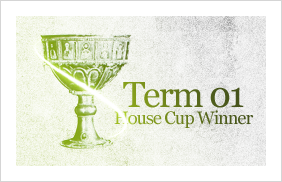
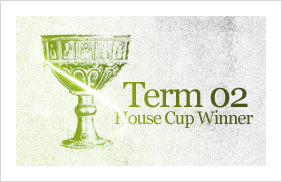
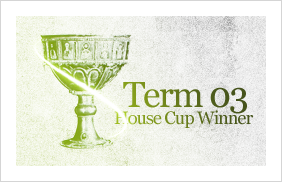
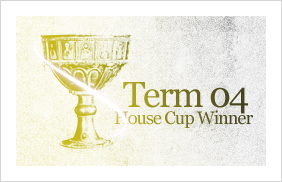
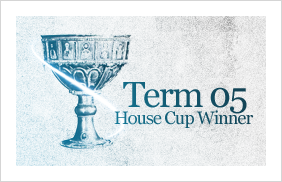
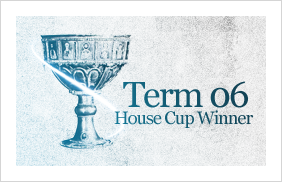
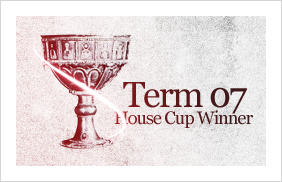
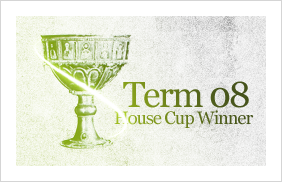
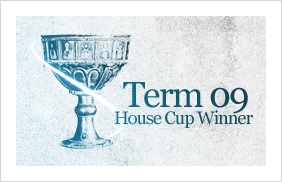
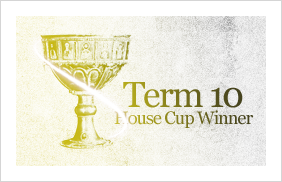
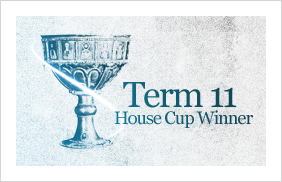
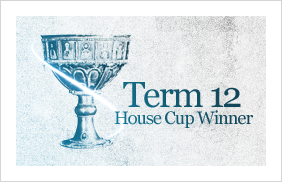
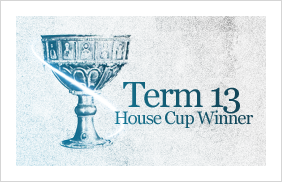
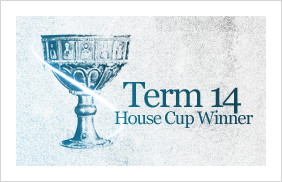
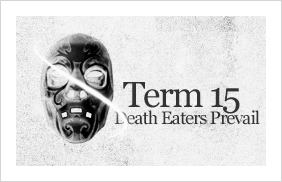
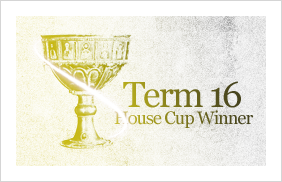

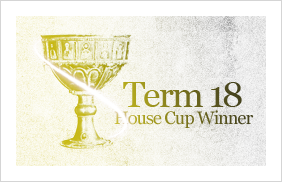
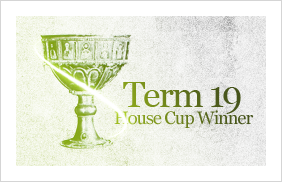
please fill out n00b survey & post to common room!